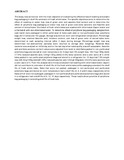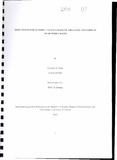| dc.description.abstract | This study was carried out with the main objective of evaluating the effectiveness of washing and plastic bag packaging in shelf life extension of fresh whole kales. The specific objectives were to determine the effect of washing on water loss, loss of green color and ascorbic Acid content and to determine the effect of polythene bag packaging on water loss, loss of green color,beta carotene and Ascorbic acid content of stored kales.
One batch of fresh whole kales was washed with chlorinated (2ppm) water and a 2nd batch with non-chlorinated water. To determine effect of polythene bag packaging, samples from each batch were packaged in either perforated (4 holes each side) or non-perforated clear polythene bags (5x12 inches and 150 gauge). Storage was done at room and refrigerated temperature.
Percentage weight loss, retained Ascorbic acid, moisture content, and loss of green color of stored kales were determined at each sampling interval (after 2 days) during storage. Percentage weight loss was determined non-destructively (samples were returned to storage after weighing).
Retained Beta carotene was analyzed on initial day and on the last day when kales quality was still acceptable. Ascorbic acid and beta carotene content values were adjusted from wwb to dwb.Kales packed in non-perforated polythene bags and stored at room temperature for 6 days had 13% weight loss, 140.7mg/l OOg (dwb) (17.9%) reduced ascorbic acid, 2.9mg/l OOg (dwb)(12.3%) beta carotene and a color score of 2, while kales packed in non perforated polythene bags and stored in a refrigerator for 12 days had 7.5% weight loss, 640.5mg1lOOg (dwb)(81.34%) reduced ascorbic acid, 5.8mgll OOg(dwb) (24.3(%) beta carotene and a color score of 3.
From the analysis done it was concluded that washing with chlorinated water (2ppm) did not contribute to extension of shelf life of the fresh whole kales while packaging extended the shelf life of fresh whole kales. Kales that were not packed, packaged in non-perforated and perforated polythene bags and stored at room temperature had a shelf life of; 4, 6 and 4 days respectively while Kales which were not packaged, packaged in non-perforated and perforated polythene bags and stored in a refrigerator had a shelf life of 6, 12, 10 days respectively. These results show potential of polythene bag packaging in extending shelf life of fresh kale. | en_US |


